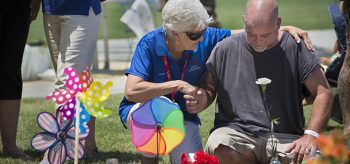2010 was a busy year for the Billy Graham Rapid Response Team (RRT). The year began with the Haiti earthquake, and ministry continues. Other deployments brought chaplains to minister to flood and tornado victims.
This year, RRT wants to equip even more people to respond to future crises and sow seeds of the Gospel. One of the ways they are doing that is training people how to minister to those going through a personal disaster–such as the death of a loved one, a divorce or a terminal illness. The classes have been adapted to address this type of crisis ministry.
“Times are very uncertain, and hopefully people will recognize that this type of training is not only applicable–but necessary–to daily life,” said Mike Beresford, Training Manager for the RRT.
Beresford says that he sees a need for the church to have a better understanding of how to respond to people in their congregations who experience personal crisis or tragedy. On average, he says, it takes only three weeks for someone in a church to leave when they do not receive the proper spiritual and emotional care during those circumstances.
He recently met with pastors from the Bristol, TN area to discuss this issue. Most of them explained that people sometimes leave churches because they were going through a personal crisis that was unknown to others within the church; thus the sufferer did not receive emotional or spiritual care. Other times, the situation was known, but the congregation did not know what to do or say to help the person in need.
“The church needs to be equipped. Once they get it, they can ask how they can come alongside the victim or sufferer. We need to be ready for more than shootings, tornadoes, floods and earthquakes. We need to be ready for tomorrow,” he explained.
“We don’t need catastrophes to find daily ministry. We, as the church, need to understand that it’s not about Sunday morning. It’s about Monday through Saturday. We need to start being the church outside the doors.”
For those who cannot attend training
While RRT is going all over the United States to conduct crises ministry training, there are still many places outside of proximity. Even if you are unable to attend a training session, there are still ways to prepare yourself to minister to someone in spiritual and emotional need.
- Recommended reading. Beresford recommends two books. One of them is The Upside of Down by Joseph Stowell and Where is God in Natural Disasters? by Erwin Lutzer. “One of the key things that Stowell says is that people ask ‘why.’ But, we don’t know why. We just know ‘Who.’ We can tell people we don’t know why, there is a God who is present that loves them.”
- Simply be present. The ministry of presence is incredibly powerful. “We often we want to ‘fix’ people but we really can’t. This introduces the opportunity to ministry, but don’t panic if you don’t feel equipped,” Beresford urges. “God has promised us that He is faithful. He can’t deny Himself. He wants to minister to those in pain. He wants to use us.”
One of the new and exciting initiatives RRT is taking to train people in compassion to train the next generation. This past November, they piloted a student training session in Charlotte. Teens from local youth groups and Christian schools were invited, and they responded strongly; 105 teens showed up so that they can minister to their peers going through crisis.
Read more about the youth training »
Since this youth training session, the changes have been made to the material and the presentation. Sessions around the country are in the planning stages.
Whether teens are being trained to help their peers get through their parents’ divorce, or an adult is being trained to minister to earthquake victims, the success of each training session is dependent on the Holy Spirit and the willingness of the churches to provide support.
“We must have the backing of our local churches,” says Beresford. “This is a wonderful opportunity for churches to come together and unite to serve their communities.”


